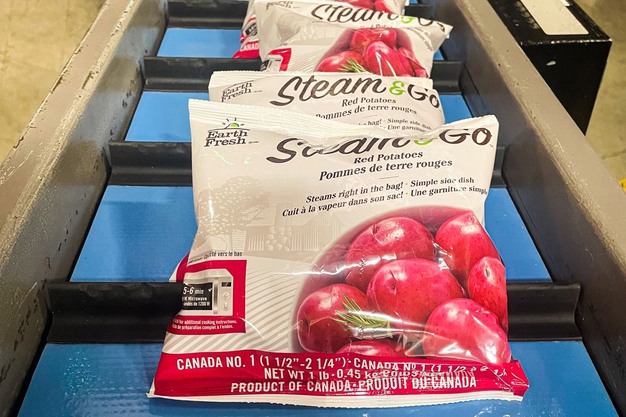A new state-of-the-art production line is helping an Ontario, Canada company get a premium local product to consumers more quickly and efficiently. EarthFresh Farms specializes in growing, packing and distributing potatoes. The company is vertically integrated in all aspects of the potato industry from seed breeding to packing and distribution.
Its customers are retailers, and food service and direct-to-home meal kit companies in Canada and the United States, with a particular focus on exclusive and premium varieties and specialty products like mini and organic potatoes.
Steadily growing demand was putting pressure on the aging equipment in its Burlington facility to keep pace, which was exacerbated by supply chain delays and inventory issues during the pandemic, resulting in lost production and inefficiencies.
 Steam & Go potato packs roll off the new assembly line at EarthFresh Farms. Source: EarthFresh Farms
Steam & Go potato packs roll off the new assembly line at EarthFresh Farms. Source: EarthFresh Farms
In early 2022, logistics also became an issue when driver shortages caused product delays across North America, resulting in a 40 percent increase in freight costs. "Our legacy packing line needed not only more labour hours for maintenance but there were also hours of stagnation where it wasn't producing at all," explains Alex Paladino Director of Operations at EarthFresh Farms. "COVID presented significant operational challenges for us, and we also needed to better insulate ourselves against staffing absence, so the target was to increase throughput, and reduce the operating costs of our plant through a strategic capital purchase."
The solution was the installation of a new, state-of-the-art packing line for bagging the company's popular mini potatoes that Paladino says has not just increased the packing rate but eliminated virtually all unplanned downtime. The company was able to access cost-share funding through the Supply Chain Stability and Adaptability Program to support the procurement and installation of the new system, which has been up and running since summer 2023.
"We've seen a 60 percent increase in uptime, combined with reduced operational expenses associated with maintenance and upkeep," says Paladino. "As well, the new system will enable us to use a variety of new sustainable and environmentally friendly packaging that we couldn't do as efficiently and effectively previously."
Greater packing capacity close to home also means lower transportation costs and a reduced carbon footprint, as well as greater internal control over supply chain logistics, which lets EarthFresh respond more rapidly to customer requests. At the same time, this offers greater higher value local market opportunities for Ontario potato growers, who are paid more for growing premium mini potatoes compared to conventional potatoes.
"The potatoes packaged in this facility are largely grown in Ontario, so this lets us reduce costs and make Ontario product more competitive by growing and packaging locally," adds Paladino. "The funding we received through the Supply Chain Stability and Adaptability Program was very important to this project, especially coming off of the tough COVID years, which made it challenging to take capital risks."
The Supply Chain Stability and Adaptability Program is funded by the government of Ontario to address supply chain challenges in the agri-food sector. The Agricultural Adaptation Council is delivering the program on behalf of the Ontario Ministry of Agriculture, Food and Agribusiness.
By Lilian Schaer for Agricultural Adaptation Council
 For more information:
For more information:
Peter Katona
Agricultural Adaptation Council
[email protected]










